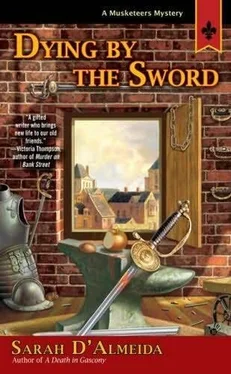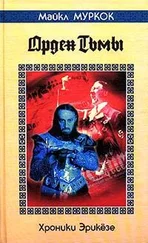Sarah D'Almeida - Dying by the Sword
Здесь есть возможность читать онлайн «Sarah D'Almeida - Dying by the Sword» весь текст электронной книги совершенно бесплатно (целиком полную версию без сокращений). В некоторых случаях можно слушать аудио, скачать через торрент в формате fb2 и присутствует краткое содержание. Жанр: Триллер, на английском языке. Описание произведения, (предисловие) а так же отзывы посетителей доступны на портале библиотеки ЛибКат.
- Название:Dying by the Sword
- Автор:
- Жанр:
- Год:неизвестен
- ISBN:нет данных
- Рейтинг книги:4 / 5. Голосов: 1
-
Избранное:Добавить в избранное
- Отзывы:
-
Ваша оценка:
- 80
- 1
- 2
- 3
- 4
- 5
Dying by the Sword: краткое содержание, описание и аннотация
Предлагаем к чтению аннотацию, описание, краткое содержание или предисловие (зависит от того, что написал сам автор книги «Dying by the Sword»). Если вы не нашли необходимую информацию о книге — напишите в комментариях, мы постараемся отыскать её.
As the Four Musketeers race to save Porthos's servant from the gallows, they run afoul of Cardinal Richelieu, who is investigating a far more serious matter – a plot against the life of the king.
Dying by the Sword — читать онлайн бесплатно полную книгу (весь текст) целиком
Ниже представлен текст книги, разбитый по страницам. Система сохранения места последней прочитанной страницы, позволяет с удобством читать онлайн бесплатно книгу «Dying by the Sword», без необходимости каждый раз заново искать на чём Вы остановились. Поставьте закладку, и сможете в любой момент перейти на страницу, на которой закончили чтение.
Интервал:
Закладка:
He watched as the baker sat and talked to his wife of how much they’d sold and of what type of bread, while she served him and then herself, from a large pot of soup she’d set in the middle of the table.
D’Artagnan had resolved, before he ever sat down, that he would eat little, and show no unusual enthusiasm for the food. Part of this was his pride, revolting at his pretending to be a mere homeless, rootless Gascon waif in Paris. The other part of it was his absolute certainty that these people-no matter the actual facts of the matter-should need the food more than he did. He had his commission as a guard, after all, as well as his career, which he was sure would be long and illustrious. He aimed for nothing else than the post Monsieur de Treville held.
And while he had absolutely no idea what ambitions lay in the future of a baker in Paris, he was sure they would be more limited than his. So, with absolute certainty that he would not let himself eat too much of these poor people’s food, he took a mouthful from his spoon.
The flavor exploded in his mouth, like a surprise, bringing with it the tastes of his childhood but much improved, unexpectedly sweeter, one playing off the other. He saw the baker looking at him, and he swallowed hastily, before taking another spoonful, feeling suddenly more ravenous than ever.
The baker laughed. “Cooks well, doesn’t she, my Adele?” He half embraced his wife, who made a playful motion to swat him away. “Eat what you will, lad,” he said. “There is plenty, and it is a compliment to the house.”
And D’Artagnan, not able to protest against the commands of his body, ate a full two bowls and a full half-loaf of the crusty, dark bread, before he could slow down. And wished he could, on some excuse, take this food back to his comrades. Though he could well imagine the reaction of aristocratic Athos faced with dark peasant bread and vegetable-heavy soup.
He was so amused by this image that it shocked him as the baker said, “Have you a job? Or do you want me to look about for one for you? We don’t need help at the shop right now, as it happens, but I’m sure-”
“Oh, no,” D’Artagnan said, quickly, fearful that he would find himself helped to a job as he’d found himself helped to food, and thereby forced to live a double life for the rest of his time in Paris, standing guard at night and working during the day in a bakery, and possibly, eventually, keeping a wife and children in each place. “Oh, no,” he said. “It is not like that. My father… you see…” and deciding, quickly, to go on a variance of his real story. “My father used to be in service with Monsieur de Treville, you know, as his valet, and he sent me with a letter to Monsieur de Treville’s valet, as used to be his apprentice. Only though they want me to work for them, they don’t have need of me right now, so they said as I could start tomorrow. It’s just the last week has been rough.”
The baker nodded. “Monsieur de Treville will look after you, right enough,” he said. “And most of his staff are from our land.” He smiled slightly at D’Artagnan, “So you were lost, were you? Or exploring Paris?”
D’Artagnan decided this was the time, if ever, to bring the subject around to what he needed to know. “Well, the thing is,” he said. And managed to look embarrassed, which in fact he was, though not over what he appeared to be. “I heard that there had been a murder this way. Some musketeer’s servant was caught at it, I heard at Monsieur de Treville’s. And of course, well…” He shrugged. “I’ve never been anywhere anyone was murdered. My village was not that big.”
The baker smiled, but something like a shadow passed his eyes. “You are lucky,” he said. “Being of a generation from Gascony which didn’t see enough death.” Then shrugged. “Not that I’m sure that the musketeer’s servant did it, mind.”
“But, dear,” his wife put in. “Everyone says as he was caught, with the sword in his hand, and his arm all over blood.”
“Adele,” her husband said, looking at her seriously, but with the twinkle of humor in his eyes. “I saw the boy taken, as did you, with all those guards around him. There was no blood on him, not even a few drops as someone will have if they stab any person or animal nearby. And the other thing is, they said he was unconscious, and what musketeer’s servant would fall unconscious after stabbing someone. For you’re not going to tell me he collapsed at the sight of blood, because that I won’t believe. Always pulling their swords in and out of their sheaths, are those musketeers, and I wouldn’t trust them for a moment, be it with my food or with my daughter, but murderers… that they’re not.” He smiled at D’Artagnan, suddenly and startlingly. “Overgrown boys, all of them. Much mischief, and all that, but also high ideals, and wanting to rescue others. Not the stuff of which murderers are made.”
D’Artagnan, stunned by the idea that anyone could call Athos-Athos!-an overgrown boy, and imagining the response of Alexandre, Count de la Fere, no matter how submerged under his nom de guerre, to such an assessment of his character, could not find words to speak, and before he could, the boy, Xavier, said, “Only they say he’d lost consciousness at a hammer that fell from the overhead rack and hit him on the head.”
The baker snorted. “Yes, and that’s likely enough, isn’t it? Xavier, you’ve been in the shop, as have I. There are no hammers on the racks, overhead. Only swords and such. Besides, as high as those racks are, if a hammer had hit the boy on the head, he’d not be unconscious, he’d be dead, and his brain, likely as not, splattered all over the floor.”
“Yes, but…” Xavier said. “Something must have happened.”
“Ah, you see,” the baker said, and then suddenly, “What is your name, son?” to D’Artagnan.
“Henri,” D’Artagnan said and then, acutely aware that to pronounce his father’s family name would give away his true origin, “Henri Bayard.”
“Well, Henri, what I say is that we don’t know the half of the story, and that it will all become clear in time, and it is none of our business. You and Xavier might find all this very exciting, and stuff to dream on. But the thing is…” He shrugged. “Murderers are not usually grabbed at the scene of the crime like that. It’s not usually that simple, is it?”
“I… I don’t know,” D’Artagnan said, startled at his own capacity for lying. “I’ve never been close enough to a murder to… to observe it.”
“And lucky you should count yourself.”
“But then…” D’Artagnan said, contriving to seem disappointed-which he was. Or at least frustrated at his inability to question the man. “But then you don’t believe this was done by the musketeer’s servant?”
The baker shrugged. “No. Or at least, I don’t believe it was, though sometimes people do things you don’t expect and would never have thought of them. But why Boniface, such a nice young man, with a sunny disposition-oh, light with his fingers, but everyone must have a failing-should feel the need to murder the armorer is quite beyond my reckoning. You see…” He shrugged. “He came around to the armorer’s a lot. Monsieur Langelier, in fact, had plans for him.”
“Plans?” D’Artagnan asked, shocked. Almost as shocked as to find that here Mousqueton went by Boniface, his name before he had become Porthos’s servant.
“Well…” The baker smiled. “Ah well. That is probably all ruined now, because her brother would never allow it, not and have to pay out money from what-I hear-is already a much eaten inheritance for her dowry. But you see, besides his son and heir, the armorer has a daughter.”
“Faustine,” Belle said, and giggled, as if the name itself were very funny.
Читать дальшеИнтервал:
Закладка:
Похожие книги на «Dying by the Sword»
Представляем Вашему вниманию похожие книги на «Dying by the Sword» списком для выбора. Мы отобрали схожую по названию и смыслу литературу в надежде предоставить читателям больше вариантов отыскать новые, интересные, ещё непрочитанные произведения.
Обсуждение, отзывы о книге «Dying by the Sword» и просто собственные мнения читателей. Оставьте ваши комментарии, напишите, что Вы думаете о произведении, его смысле или главных героях. Укажите что конкретно понравилось, а что нет, и почему Вы так считаете.











